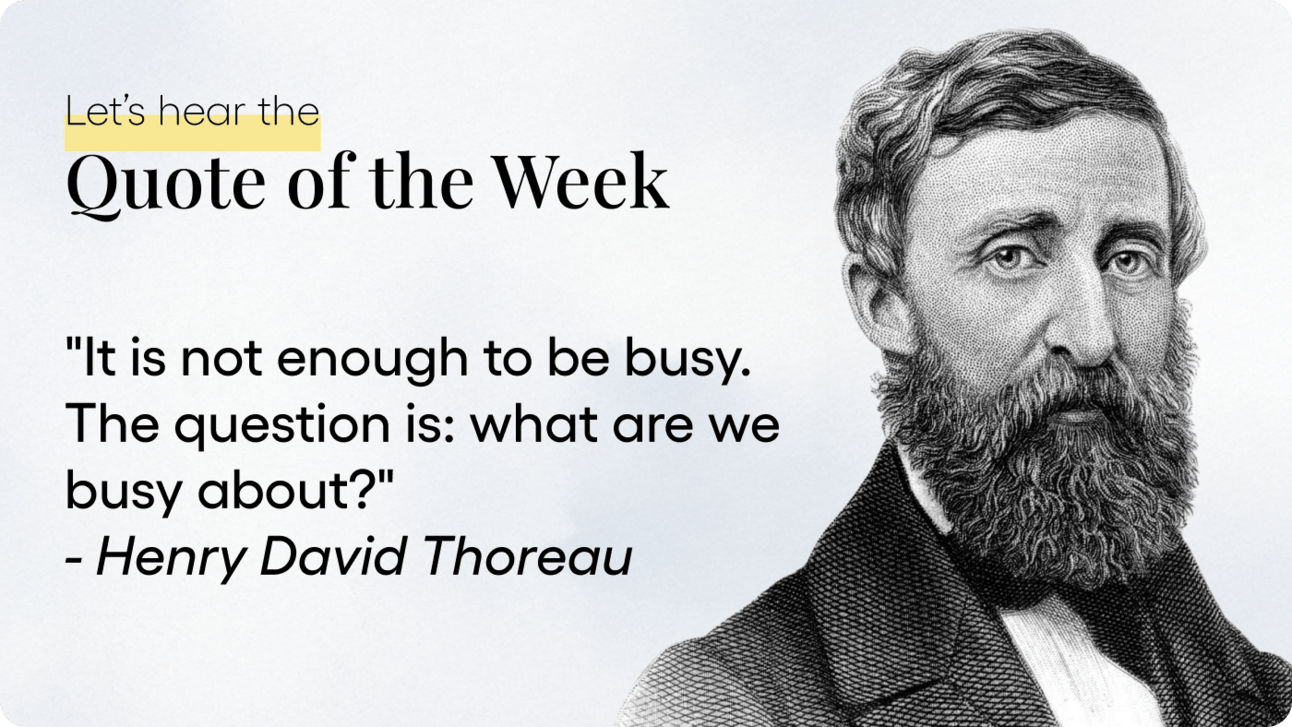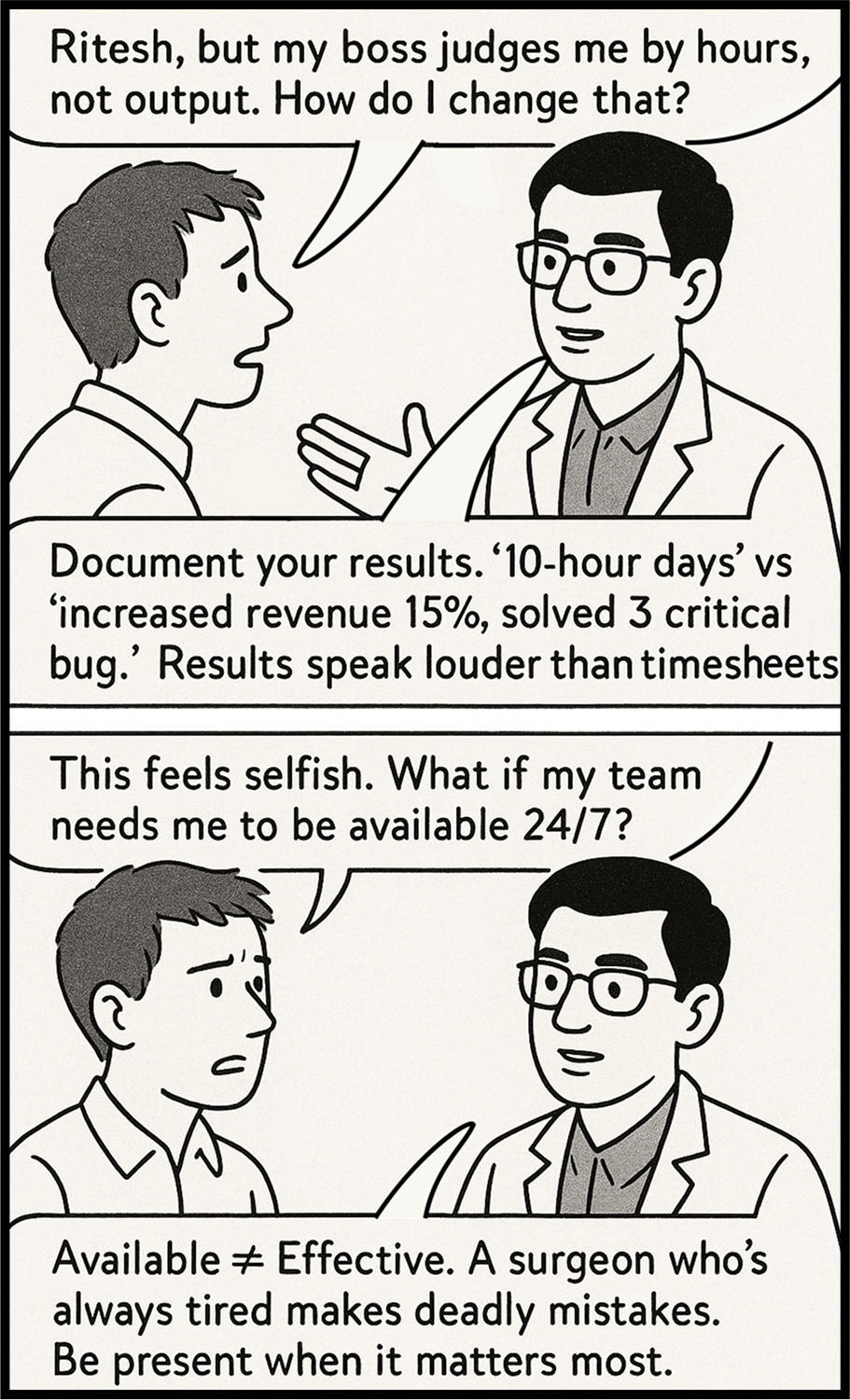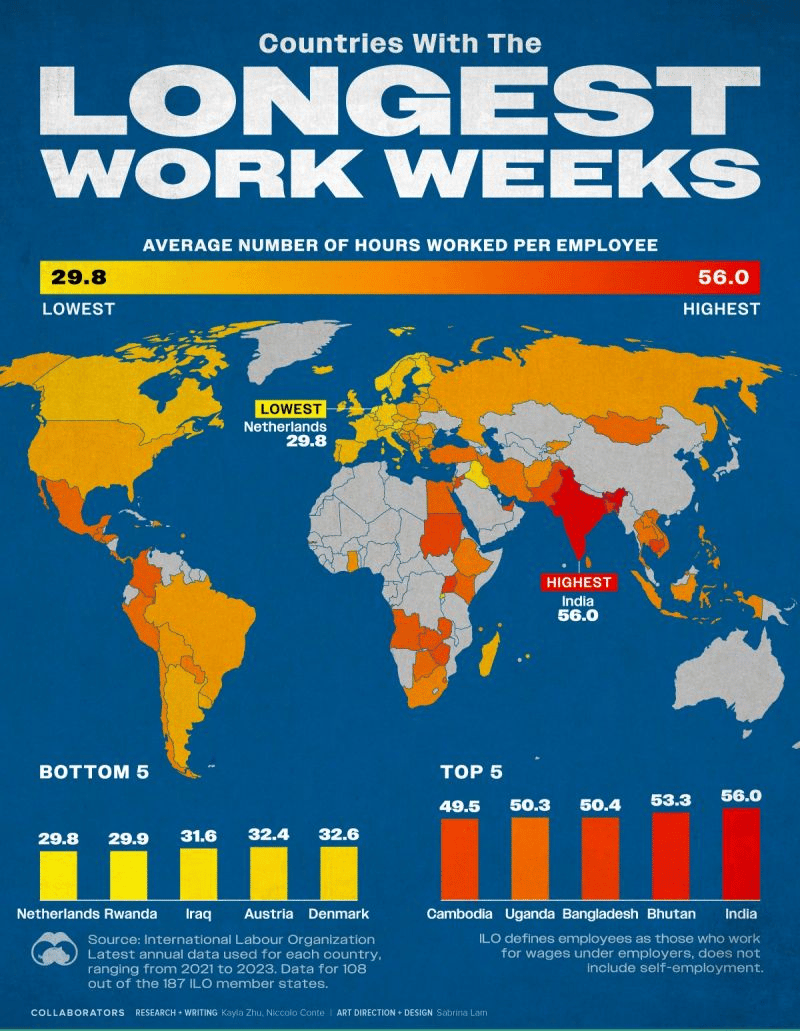- Ritesh Malik
- Posts
- we aren't productive
we aren't productive
hours worked is not equal to output achieved

Research shows Indians work more than 50 hours per week. The highest globally.
Yet our labour productivity ranks 133rd in the world.
Strange. We're working harder, not smarter.
Sometimes less is more.
Look at Indian labour productivity: $8.7 per hour. UK’s productivity: $54.3 per hour.
They work 455 fewer hours per year. But create 6x more value per hour.
But why does that happen? Cognitive heemorrhaging.
Dr. Sophie Leroy's research shows something terrifying: every time you switch tasks, part of your brain stays behind. She calls it "attention residue."
Imagine trying to cook while having 10 different conversations. You'd burn everything.
I've spent 15 years studying human performance. Both in operating rooms and boardrooms.
In the ER, we often celebrated the doctors who saved the most lives. Not the ones who work the longest shifts.
Duration means nothing if the patient doesn't survive.
Results trump effort. Every single time.
And the pattern is the same across every domain.
High-performance environments don't maximise effort. They optimise recovery.
Think about it:
Elite athletes train 5-6 hours per day, not 12.
Top surgeons operate in focused blocks, not marathons.
Fighter pilots fly in short, intense missions, not endless patrols.
But somehow, we've convinced ourselves that knowledge work is different.
That brains don't need the same care as bodies.
We're wrong.
Recent neuroscience research reveals that peak cognitive performance follows ultradian rhythms.
In simple words, 90-minute cycles of intense focus followed by 20-minute recovery periods.
Your brain literally can't sustain deep thinking for more than 90 minutes without degrading.
Yet we schedule 8-hour "deep work" days and wonder why nothing gets done.
This isn't just a startup problem. It's destroying India's economic potential.
MIT research shows that if the US had maintained its 1995-2004 productivity growth rate, GDP would be $4.2 trillion higher today.

Last week, I got a call. "Ritesh, we need help. Our numbers are dropping."
Arjun (name changed for privacy) runs a 200-person startup.
Every time I visited his office, he was there. 7 AM to 11 PM.
Weekends included. His team called him "The Machine."
But his company was stagnating.
I asked him: "Show me what you personally delivered this month."
He pulled out his packed calendar. "I was in back-to-back meetings, reviewing everything, staying on top of all decisions..."
"That's not what I asked. What did YOU deliver?"
Uncomfortable silence.
That's when it hit both of us. He was the busiest person in the company producing the least value.
This is India's silent epidemic: The Productivity Paradox.
We mistake being busy for being productive.
Activity for achievement. Hours for impact.
"Fire your productivity habits. All of them", I said.
Instead, I gave him three prescriptions:
Prescription 1: The 90-Minute Protocol
Professionals working in 90-minute blocks report 40% higher productivity and 50% less mental fatigue.
New rule: Maximum 4 deep work blocks per day. 90 minutes each. 20-minute breaks between.
No meetings during deep work blocks. No Slack. No emails. No exceptions.
Prescription 2: Single-Task Surgery
Task-switching costs up to 40% of productive time.
New rule: One task, one block, one outcome.
Before starting any work: "What specific deliverable will I complete in the next 90 minutes?"
If you can't answer, don't start. Rethink!
Prescription 3: The Output Audit
Most productivity metrics measure inputs (hours worked, meetings attended, emails sent).
New rule: Only measure outputs (features shipped, revenue generated, problems solved).
Daily question: "What did I complete today that moves our mission forward?"
Weekly question: "What would happen if I hadn't worked this week?"

India's productivity crisis isn't about work ethic. It's about work intelligence.
The solution isn't working harder. It's working conscious.
Flow state research shows people in optimal performance states are 500% more productive than those grinding through distracted work.
But flow requires what Indian culture discourages: strategic rest.
We celebrate the grind. We should celebrate the pause as well.
And understand that our brain is not a machine.
It's a biological system with natural rhythms, limited capacity, and recovery requirements.
Our potential is massive.
Will we evolve from a nation that celebrates suffering to one that delivers success?
The choice is ours!

📊 The Number That Matters
67% of meetings are unnecessary and could be replaced with a 2-minute message.
❓ Your Questions Answered

❓ Your Honest Answer
When you strip away all the meetings, emails, and "coordination", what actual value did you create this week?
Tell me in your reply. No judgment. Just curiosity.
I’ll read all of them!
Until next time,
Ritesh
